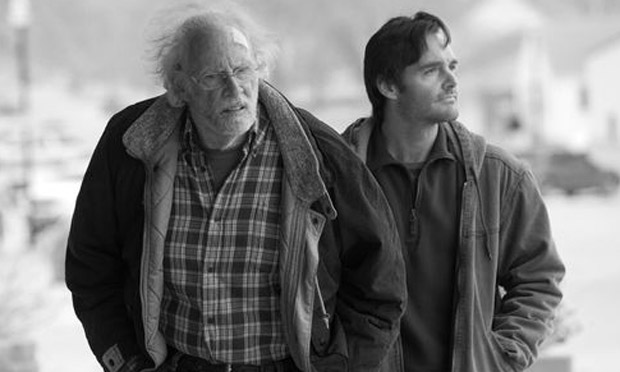Title: Nebraska
Paramount Pictures
Reviewed for Shockya by Harvey Karten. Data-based on RottenTomatoes.com
Grade: B+
Director: Alexander Payne
Screenwriter: Bob Nelson
Cast: Bruce Dern, Will Forte, Bob Odenkirk, Stacy Keach, June Squibb
Screened at: Dolby88, NYC, 11/18/13
Opens: November 15, 2013
Of the many regrets that people may have when their fathers pass away is, “I wish I got to know my dad better.” Alexander Payne gives lyrical dimensions to this pit-of-the-stomach feeling with Bob Nelson’s script in “Nebraska.” Essentially the story is of a man apparently in his eighties, confused, with maybe borderline dementia, who reportedly “never gave a damn” about his two sons. Whether that’s true or not, one of the middle-aged men has a chance finally to get to know his old man in this road-and-buddy movie traversing Wyoming, Montana, South Dakota and Nebraska. These are the areas of the U.S. sometimes called flyover country by urban folks, a rude, overly generalized opinion that with one swoop deletes all the details of these areas. Who lives there? What are the medium-sized cities like Lincoln and Omaha like? What about the people on the outskirts? And especially, what about the rural areas, which are within Payne’s vision?
If you believe Payne and trust what appears to be some common sense, many of the younger people have moved away from the farmlands in search of better opportunities elsewhere. Payne doesn’t care about the youths this time around, this movie is not like his “Election,” but has him focusing on older people as he did in “About Schmidt,” wherein a newly retired man heads off to his estranged daughter’s wedding after his wife had suddenly died.
Filming in black and white ostensibly to produce an iconic look at Everyman, Payne looks primarily at people in their sixties, seventies and beyond who have fit themselves into grooves and seem content with their lives—or maybe they had never sit down to question their existences or dream much about alternatives. Woody Grant (Bruce Dern) is seen at first walking from his home town of Billings Montana to Lincoln Nebraska—yes, walking—until a nice officer sends him back to his wife Kate Grant (June Squibb). He holds a document in hand that appears to state that he has won a million dollars from Publishers Clearing House–never mind that the paper says “if you have the lucky number” or that it’s little more than an ad for magazines. He wants to go to Lincoln to pick up the million, ignoring the counsel of his son, who eventually gives up and decides to allow his father to live a fantasy for a while.
What follows is a long drive, son David (Will Forte) behind the wheel, his gray-bearded dad single-mindedly holding on to his dream. As with other road-buddy fare, the two make several stops along the way, in this case to meet mostly older people who still remember Woody when he and they lived together in the town of Hawthorne, Nebraska (filmed in that state’s town of Norfolk). Everyone believes Woody’s story, cheering on the would-be millionaire, with some former neighbors like Ed Pegram (Stacy Keach) staking out claims to money that Woody allegedly borrowed from them forty years earlier.
The story is told through David’s point of view as a man in a dead-end retail job, an alcoholic like his dad, a fellow who finally gets to know more about the guy that helped grant him birth. David visits his dad’s former girlfriend (Angela McEwan), who now works in the small town’s newspaper and who once competed against Kate for Woody’s hand. David learns details about his father’s Korean War service. Whether Woody learns anything new about his son or about his son’s older brother Ross Grant (Bob Odenkirk) is anybody’s guess. He appears confused either from alcoholism or dementia or just as a defense mechanism, avoiding any truths that may make him uncomfortable.
Geography is a metaphor, the long, dusty roads serving as a symbol of the old man’s life and informing those of us in the audience whose knowledge of Nebraska comes from peeking through the clouds on Jet Blue airlines. Not only is Payne’s film a fascinating portrait of Norman Rockwell country where few inhabitants are under sixty-five years of age but serves as a launching pad for a terrific acting role from Bruce Dern, hardly an A-list Hollywood performer, now competing for Best Actor awards against the likes of Robert Redford (“All is Lost”) and Chiewetel Ejiofor (“12 Years a Slave”). As Dern’s character traverses a landscape that he knows, his inner journey takes him through a host of emotions; his own regrets perhaps at never really knowing his two sons, his feeling that his life has been wasted, his annoyance at the way people treat him not only when they think their own pal is a millionaire and when they realize that the wealth is mere fantasy.
The cast performs as marvelous background to Woody’s life, including June Squibb as his wife who forever declares that she will put him in a home, his older son played by Bob Odenkirk who from the start wants to squelch his dad’s fantasy, and a host of old timers whose great joy appears to sit together in front of a TV to watch the game. Forget football for a sec, though. “Nebraska” paints a portrait of the game of life, one in which all of us participate, and like any sport is filled with wins, losses, and draws.
Rated R. 110 minutes © 2013 by Harvey Karten, Member, New York Film Critics Online
Story – B+
Acting – A-
Technical – B+
Overall – B+

